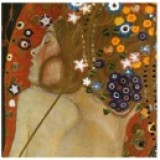WOTD: Earth
-
Jordan
13 years agoAt the request of one Sybillene.
Earth
n.
Pronunciation:
[urth]
Definition:
1. (often initial capital letter) the planet third in order from the sun, having an equatorial diameter of 7926 miles (12,755 km) and a polar diameter of 7900 miles (12,714 km), a mean distance from the sun of 92.9 million miles (149.6 million km), and a period of revolution of 365.26 days, and having one satellite.
2. the inhabitants of this planet, especially the human inhabitants: The whole earth rejoiced.
3. this planet as the habitation of humans, often in contrast to heaven and hell: to create a hell on earth.
4.the surface of this planet: to fall to earth.
5.the solid matter of this planet; dry land; ground.
Etymology:
O.E. eorþe "ground, soil, dry land," also used (along with middangeard) for "the (material) world" (as opposed to the heavens or the underworld), from P.Gmc. *ertho (cf. O.Fris. erthe "earth," O.S. ertha, O.N. jörð, M.Du. eerde, Du. aarde, O.H.G. erda, Ger. Erde, Goth. airþa), from PIE base *er- "earth, ground" (cf. M.Ir. -ert "earth"). The earth considered as a planet was so called from c.1400.
*NOTE: It's a purely Germanic word! It's not borrowed and you won't find any words similar to it in non-Germanic languages.
Quote with the word:
"Blessed are the meek: for they shall inherit the earth."
-unknown -
Jordan
13 years agoOh, no problem.
Also, to answer your question - Nope! The Germanic family is part of the Indo-European family. The thing about it is that there seems to be a different name for the world in each Indo-European language family. So we have words like Latin 'terra', Greek 'gaia' (among other words), Sanskrit 'prthivi', etc.
I made a point to say that it was uniquely Germanic because as far as English vocabulary goes, the amount of borrowed words is approx 5.6x the number of words of actual English origin. -
Jordan
13 years agoYeah, about 85% of our lexicon is of French, Latin, and Greek origin. With a few others here and there.
I think a lot of us do love those words, though. Hence why 100% of the most frequently used words are of Germanic origin. :D
This is from Wikipedia, not sure how accurate it is, (also, note the forms which are different from those I mentioned before).
Proto Indo-European: *dheghom- "earth" (reconstructed using terms below).
Latin: humus
Ancient Greek: khthon (khthonos)
Sanskrit: ksah
Avestan: za
Old Church Slavonic: zemlja
Lithuanian: zheme
Old Irish: du
Albanian: dhe
Tocharian: Atkam
Hittite: tekan
English: Earth.
We win. There is no cognate for our word. So yes. -
-
Jordan
13 years agoPrepositions, conjunctions, complementizers, and determiners all have their roots in Old English - there was never any need to borrow them. Lots of basic verbs are of Germanic origin, as are some common nouns.
Anything that sounds scholarly and can be broken down into a stupid number of affixes is borrowed. Most if not all scientific terms are also made up of borrowed words. -
Hellon
13 years agoI always enjoy these threads from you Jordan and I see them as a great learning curve for someone like myself who left school years ago and, are not as clued up as you younger people who are still in school/uni so..I was very glad to see you bringing WOTD back!
I understand what you are saying about germanic words but I was wondering if the authenticity of the word earth would alter in any way if a modern word was added? One that comes to mind right now is Google Earth. Hope this makes sense...probably not haha!!! -
Jordan
13 years agoWELCOME BACK! Couldn't stay away, I see.
What do you mean the authenticity? Do you mean its relation to its parent word? If so, that doesn't really change a thing, nope. Adding prefixes/suffixes does not change anything about a root, historically or otherwise. Further more, I think that Google is a purely English word. So we're even more safe!
When it comes to languages today, I don't see the addition of new words and forms as unnatural. Language change is purely natural and so I merely see present language forms as future relics. Make sense? -
Hellon
13 years agoYes...that's what I meant Jordan...Would it affect the parent word? I'm not sure of the origins of the word google, I do know it was a fairly common word used in the UK way before Google was around but I'm really not sure how old the word is.
Thanks for your answer and...thanks for the welcome. -
Michael D Nalley
13 years ago"Thy Will be done, on earth as it is in Heaven."
I can only imagine that any culture would have used a word similar in meaning in their science or religion
Egyptian name for Egypt, which was itself based on the Ancient Egyptian word keme (hieroglyphic Khmi, black earth, as opposed to desert sand
Classical elements in Babylonia The concept of the four classical elements in the Western tradition originates from Babylonian mythology. , a text written between the 18th and 16th centuries BC, describes five cosmic elements: the sea, earth, fire, sky, and wind. -
Edward D Zurovec
13 years agoThe first utterance of the early Ape
"Earth" heard in a low tone.
Of those 5 Cosmic elements:
We're adrift in a finite sea
Washed up on Earth
Which is, a fire storm
Sky's the limit
End up, Pissing in the Wind
I would like to thank JJW for that last line!




